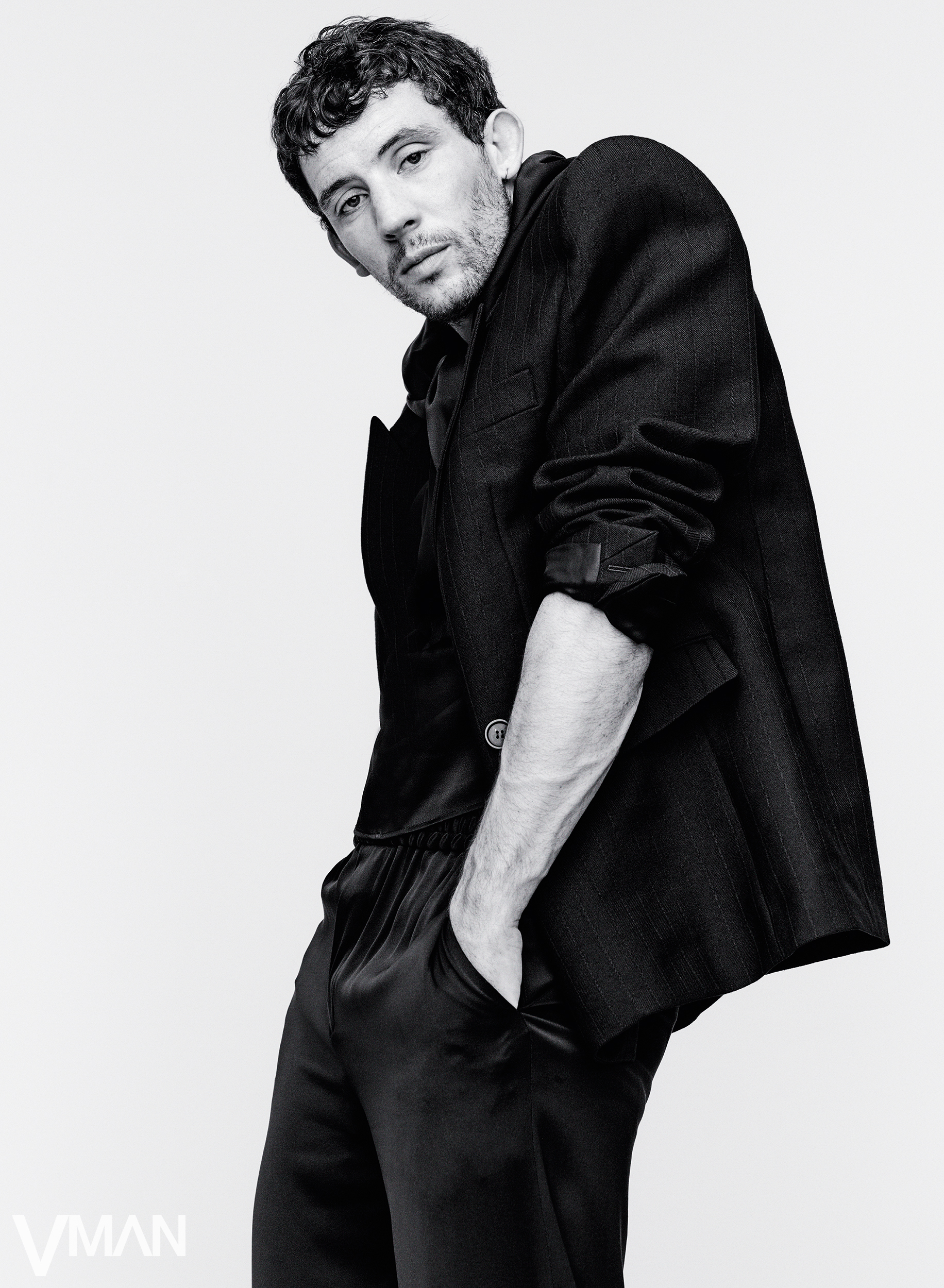In the game of tennis, love equates to nothing.
Ever since the sport became popular in the late 19th century, love has been used to represent zero points. The term derives from the expression “to play for love,” or the idea that the player who fails to score any points isn’t bothered because they are simply playing for love. This messy entanglement between the affairs of the heart and the court is the subject of Josh O’Connor’s latest film, Challengers, out in 2024. The “psychological and deeply emotional” thriller, directed by Luca Guadagnino, sees O’Connor take on the role of Patrick, a once-promising, but now burnt-out professional tennis player, caught up in a tumultuous love triangle with his former friend, Art (Mike Faist), and ex-girlfriend, Tashi (Zendaya).
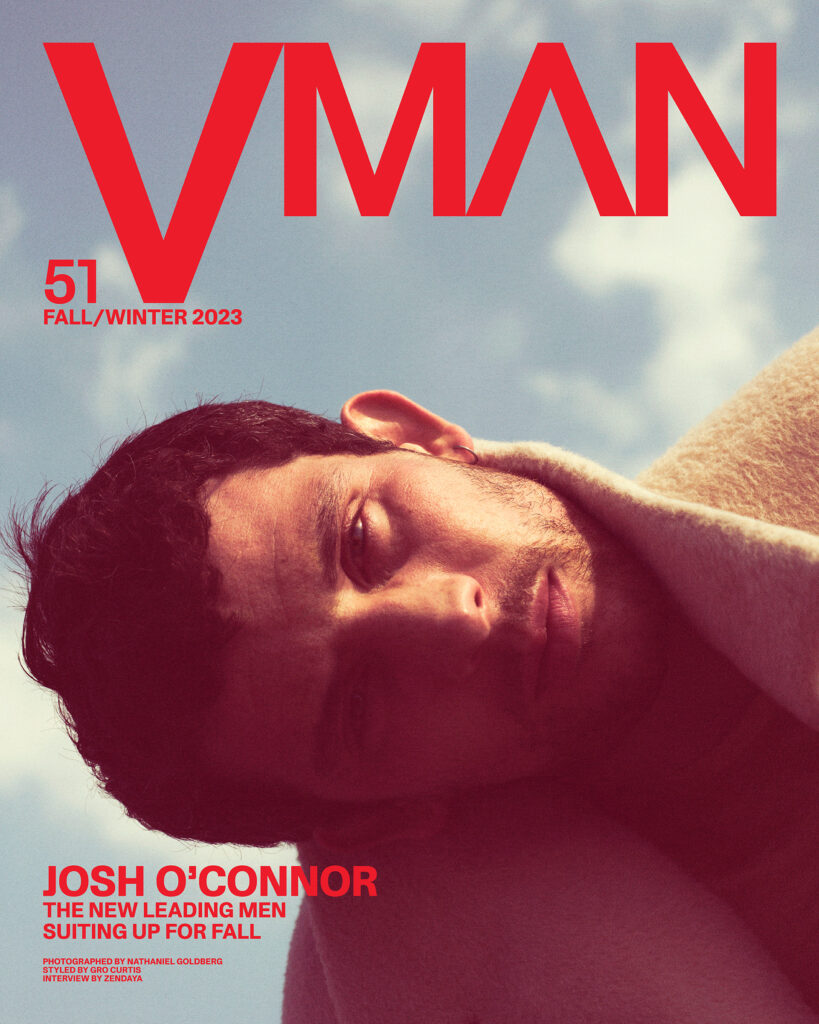
“I think we can both agree that you’re a great person, but you’re nothing like Patrick,” Zendaya laughs, and Josh nods in agreement. “Our characters are horrific,” he shares over Zoom, describing the dynamic between the competitive tennis players: “We are all the puppet masters at different moments.” The off-screen friends fold over and giggle, as they reminisce about how much fun they had last summer filming the movie in Boston. There was that time they watched Ratatouille in O’Connor’s apartment and oh, that other time they sang Beyoncé’s “Break My Soul” in between takes of the final scene.
“My dad, who was an English teacher, used to always talk about Shakespeare. And the thing he’d tell me about Shakespeare’s villains is that they don’t think of themselves as villains. That message has always stuck with me, but particularly as I took on the role of Patrick in Challengers.” —Josh O’Connor
O’Connor is one of a few actors of his generation who can command the silver screen, regardless of the role he takes on—whether he’s playing Arthur in La Chimera or Romeo in Romeo & Juliet. Francis Lee, who directed O’Connor in his role as a Yorkshire farmer in the 2017 indie film God’s Own Country, has said that he is her “favorite kind of actor, a transformative actor,” while Olivia Colman, who played his mother in The Crown, says he’s “out there with the greats.” As magnificent as his on-screen performances are, O’Connor’s creative heart lies elsewhere.
“I think the reason why we didn’t end up talking about why you became an actor is because I realized that your true passion was ceramics,” Zendaya theorizes. And it’s true. O’Connor confesses he’s at his happiest when he’s in the studio, his hands messy with clay. But the 33-year-old explains there’s a through line in all of his work: “I love the process of taking something from the ground, using your hands, and making something that lives forever. That ties into my acting—we use our imagination and the source material from great writing and work with another human being to create something that hopefully lasts forever.”
O’Connor explains all of this from the Alamosa, Colorado, where he’s on set for his next film. “I was horseback riding yesterday and got completely burned,” he tells Zendaya, cracking up. And as for his plans after the film wraps? The actor is keeping schtum for now. What’s clear is he’s embracing the unpredictable push and pull of his profession. “I love that I can go make a movie,” says O’Connor, “and then I can go off and live in my van by a lake. So going forward, there’s no real plan. I’m just figuring it out as I go along.”
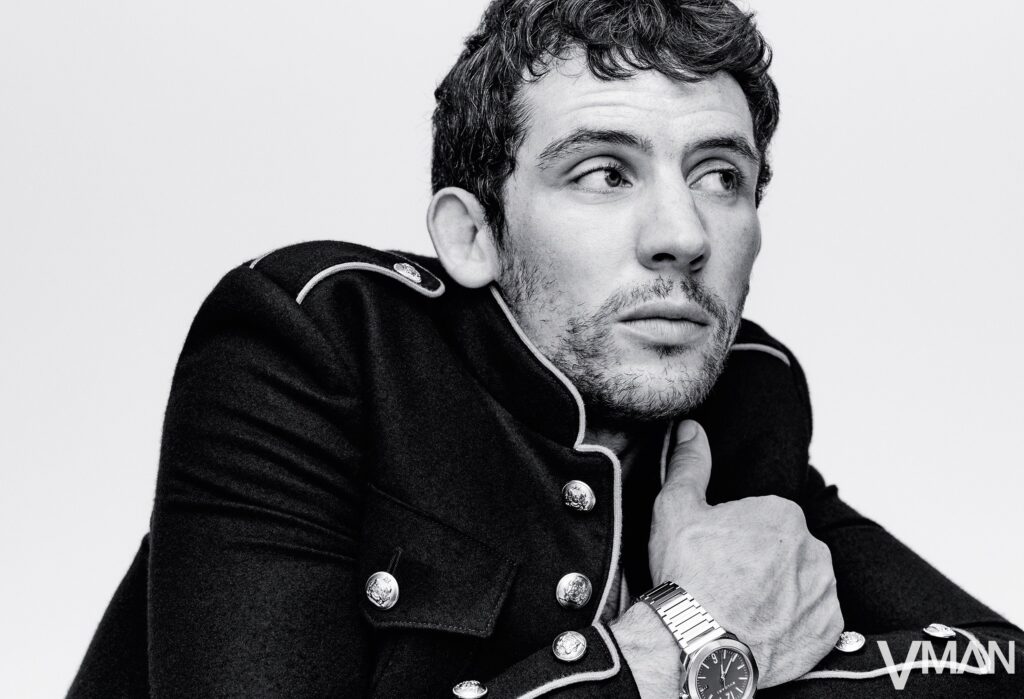
ZENDAYA: Hello!
JOSH O’CONNOR: Is that you, Z?
Z: Yeah, it’s me [laughs]. Ok, let me put my journalist hat on real quick.
JO: I can’t believe you’ve got a journalist hat [laughs].
Z: Of course, I have one. Okay, I want to start at the beginning. And I can’t believe I don’t already know the answer to this, but when did you start acting? Where did your love for this come from?
JO: It’s weird that we haven’t talked about this because from what I know about you is that you’ve been doing this for so long – and I kind of came to it. I think in the UK, it’s slightly different because there’s a traditional route you’re supposed to follow. You’re supposed to go through drama school training, work in a theater, and then work your way up. But that’s all changed over the years. Some of the best actors in the UK are not trained, so it’s definitely not a be-all, end-all.
I was just a pain in the ass as a kid and didn’t really know what I was doing. But I remember I was always obsessed with art. I was always drawing – my grandmother is a ceramicist, so I was always hanging out in her studio. My grandfather is a sculptor and I always wanted to do that stuff. I did one play at school, and they were like, “You should do more.” And I was like, “Well, this is kind of an easy subject to get good at because you don’t have to write anything.” And it just went from there. But it was definitely not early, it was actually quite late.
Z: And what was your first film? Because I have to go watch it.
JO: I’m only going to tell you if you promise never to watch it. It’s so bad [laughs].
Z: I can’t promise that. I’m so sorry [laughs].
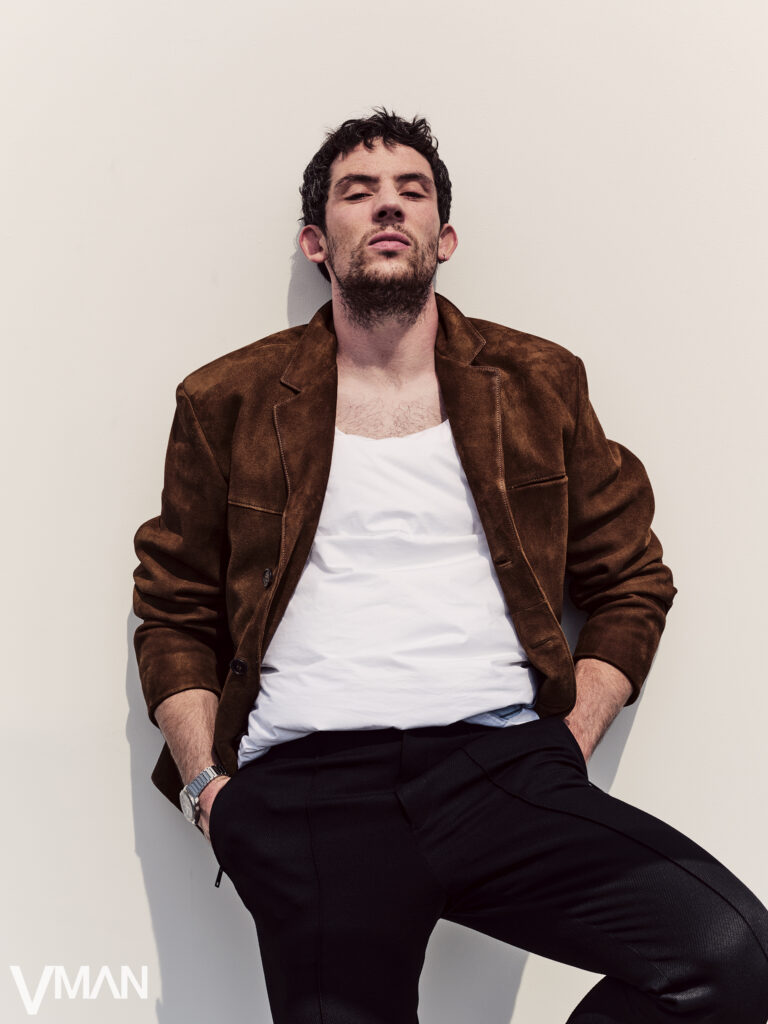
JO: I did two films. One was called The Magnificent Eleven, which was a take on The Magnificent Seven – an amazing film. It was set around the East End of London and all these footballers. These [characters] were all in a Sunday League football team. So I did that, and then I did a film around the same time with this amazing filmmaker, Joanna Coates. She just made a couple of short films, and I worked on her first feature film. At the time, she was like, “I’m going to make this my first feature film, and we’re going to make it with 13,000 pounds.” We all lived under this one roof – Luca [Guadagnino] would have loved this film. All four of us lived under this one roof, and we cooked for each other. Some days I was like holding the boom; other days, I was behind the camera. So for me, that film is still very much a part of me. I’m so proud of it.
Z: Yeah, definitely. You’re part of this larger thing, and it doesn’t matter really how it turns out. It’s the experience that’s so special.
JO: Exactly. And I know with you because you started off so young–but when you go into it young, these film sets are really like a family. And I think if you got that feeling early on in your career, then naturally, you’ll want to be generous with the crew, and you want the crew to be generous with you because you have this relationship with them. You have an understanding that it’s beneficial to everyone if everyone gets on. And so whilst I didn’t have this experience super young, like you, I think you must have had a similar experience.
Z: Yeah, definitely. I’d also love to hear you talk about your experience filming Challengers. We haven’t really talked about the process, but I think we built our own community. We had rehearsal time, and we had time to talk about it. How was that for you? Because I really enjoyed it. I feel like we don’t get that often anymore.
JO: I totally agree. I haven’t really had that on a film. I’ve been really fortunate early on in my career – with the British indie movies that I started out with – to have directors work out scenes with me. Like when I did God’s Own Country, I lived on a farm and worked on that farm for months before filming.
Z: Oh, that’s cool. I didn’t know that.
JO: Yeah, and that was all really helpful for me. But then, for something like Challengers that script – just the script – is so delicious. The dialogue is so good. For most of my career, like when I started out in theater, those rehearsal days were my favorite days. They were the best part of the whole job because we were all living together – sipping coffee and just trying to figure out these scenes.
We all have an instinct, and particularly on Challengers, it can feel a little bit daunting coming in on the first day. I remember thinking, “There’s Z and Mike [Faist], both of whom are killing it.” It’s intimidating until you start sitting down and talking to the teams. Because you realize that none of us, including Luca – Luca has an idea of what he wants – but none of us know what any of these scenes are about because they can be about any number of things.
Z: I completely agree. And let me just add – I think all of us felt that on the first day. I was so excited to go into it as I loved The Crown, and I saw Mike on opening night of Dear Evan Hanson.
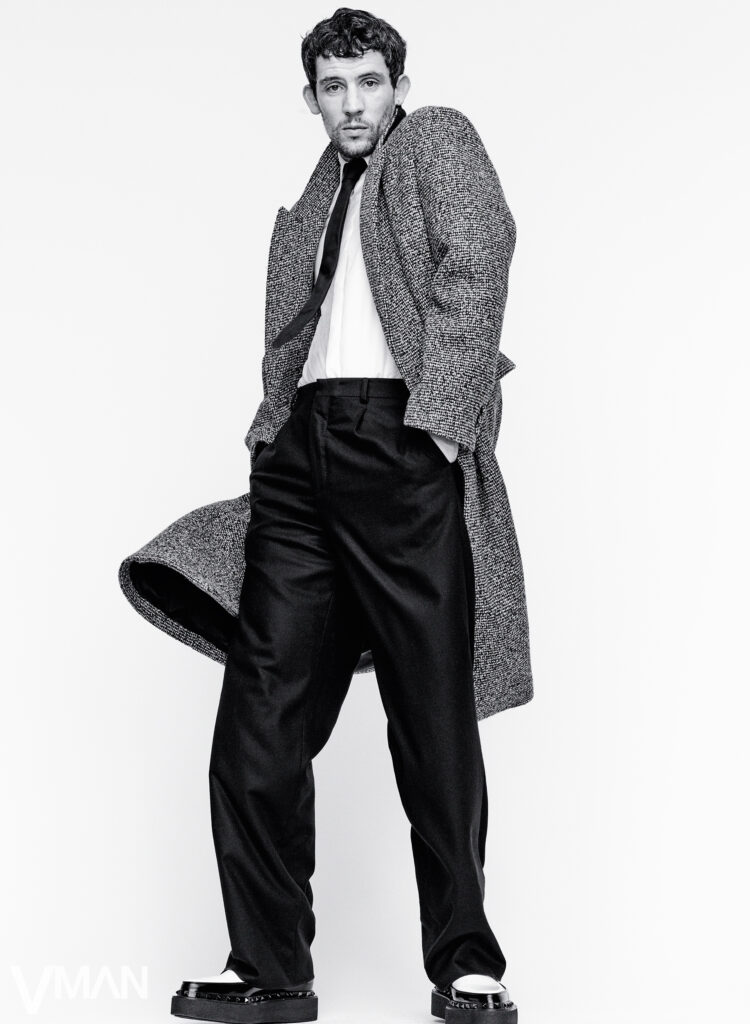
JO: Yes, I remember this!
Z: Anway, I was a big fan and thought you guys were so talented. And I think just as an actor in general, you often walk into things and you’re like, “I don’t deserve to be here.”
JO: Yeah, that’s the other thing. It’s mad to hear someone like you say that. But actually, we are all the same in that way. Because ultimately, every time you finish the job, you’re unemployed. And it sounds absurd, but there’s always this haunting feeling of like, “I don’t deserve this.” Because at any given time, 99% of actors are unemployed. So there’s always this feeling of like, “I’m so lucky to be able to do what I love.” And to be around other actors that you feel are proper, proper actors who are feeling the same insecurities makes it so much easier. Because you’re all on a level playing field, and you’re still doing your thing.
Z: You’ve taken on beautiful projects. I’m curious to learn how you choose them. Is it one of those things where you read the description, and you just know right away? Or does the director entice you?
JO: While I’d love to proclaim that I have this very clear idea of the kind of actor I want to be – or the kind of work I want to make, I don’t know everything yet. I’m still figuring it out and honing my craft as I go. I think we all have a sense of the kind of work that interests us.
This film I’m about to start in Colorado – the scriptures are wild. I have nothing to grasp onto, but for some reason, it just hit me. And likewise, for Challengers – we all knew the script was amazing. But the team adds to that. There’s an amazing team here – there’s you, Mike, Luca, Amy [Pascal], and MGM. So you know it’s going to be something that’s different. I think the script is definitely the first draw, but then the director makes a big difference to me. Sometimes you just have that link with someone, and you’re like, “I’m just going to follow your lead.”
I assume it’s the same with you, right? It kind of changes for each project?
Z: Yeah, absolutely. For me, as you said, it was the script. It was the prospect of maybe being able to work with you guys. I was like, “Fingers crossed that they feel what I feel.” But, also talking to Luca. I think one thing he’s really good at is thinking about the script within the script – carving out things I didn’t see about the characters. We talked about it a lot on set, but there are so many layers there. And I think he’s good at finding that nuance, you know?
JO: Yeah, Luca just brings something out. It’s not just a tennis movie or a movie about a love triangle, it’s psychological, it’s emotional, it’s grief, it’s everything.
Z: It’s super intense. I would agree. There’s a script on paper, which is obviously super fun, but there are layers that you can play with in real life. I think we can both agree that you’re a great person, but you’re nothing like Patrick. And that’s the fun, you know?
JO: Yeah, exactly. We were just saying the other day that our characters in this film are horrific.
Z: They’re terrible.
JO: They are so terrible. And we just released the trailer this week, and a few of my friends were like, “Oh my god, it’s so nice to see you smiling in a film.” And I was like, “Oh god.” If they think they can see the real Josh with an American accent, this is not it. I am not like this, I promise [laughs].
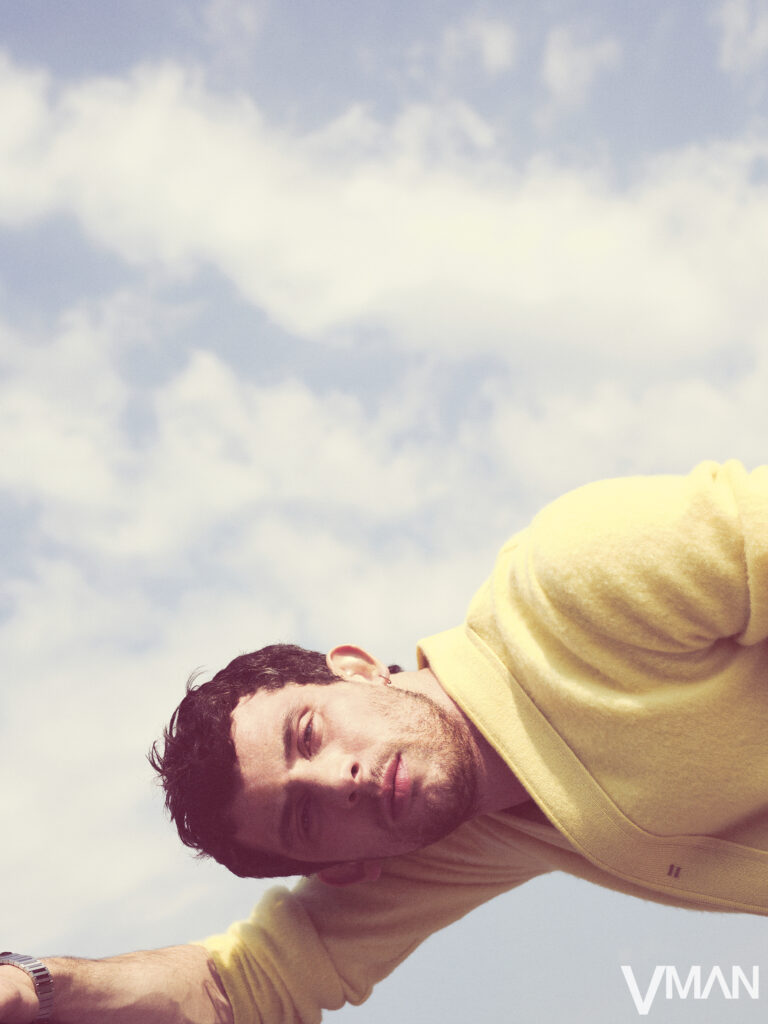
“While I’d love to proclaim that I have this very clear idea of the kind of actor I want to be – or the kind of work I want to make, I don’t know everything yet. I’m still figuring it out and honing my craft as I go. ” —Josh O’Connor
Z: But that’s what was so fun, right? I hate to say villain, but there’s a villain-esque quality there to all of the characters. And I think that was fun.
JO: When I first read the script, my immediate thoughts were, “Patrick’s a villain, Tashi’s kind of a villain, and poor Art.” All I could think was, “This poor guy.”
Z: Oh my god, I know. I felt that once and then I read it again [laughs].
JO: Yeah, for me, there was this revelation moment where I was like, “Holy shit, the little snake!” It was a big breakthrough for me with the character because I slowly discovered that Art has his own darkness.
And I’ve been thinking about it, but this was certainly the biggest budget film I’ve made. And to be in a room – church hall or whatever in Boston – with you, Mike, Justin, Luca, and Amy for three weeks straight just talking about things. How insanely cool is that? We really lucked out. Have you ever had that kind of rehearsal and space for a film of that size? Because you’ve got more experience working with this size of film?
Z: Never of this magnitude, no. You just dive into the deep end, and it’s all happening. Usually, with big films there are so many pieces, but with this, it was just us three.
JO: With Malcolm & Marie, did you have this time?
Z: Yeah, that was more similar to this. We had weeks and weeks of quarantining and just talking about it. But again, that was just us. It was tiny – it was like a skeleton crew. So you had that atmosphere of wearing a lot of hats like you were saying with your earlier projects – like I was doing my hair and makeup and all these things. So to have that same intimacy – knowing everybody and feeling close to everybody – then also simultaneously, it being a more massive project was so cool because I’ve never had that before.
JO: The Crown is probably the closest thing to Challengers in size, but also the dialogue descriptors, which were the thing. The most important thing in The Crown was the script by Peter Morgan. And so most of the time, I was like, “How the fuck are you meant to do this without rehearsing it?” And you turn up and Olivia Coleman is in total God mode, and she knows exactly what to do. She has an instinctive thing. But even she knows that half the battle is what the other person’s offering up. So yeah, I still count myself and all of us so lucky to have got that time. And I think it will make that film ping out so much better.
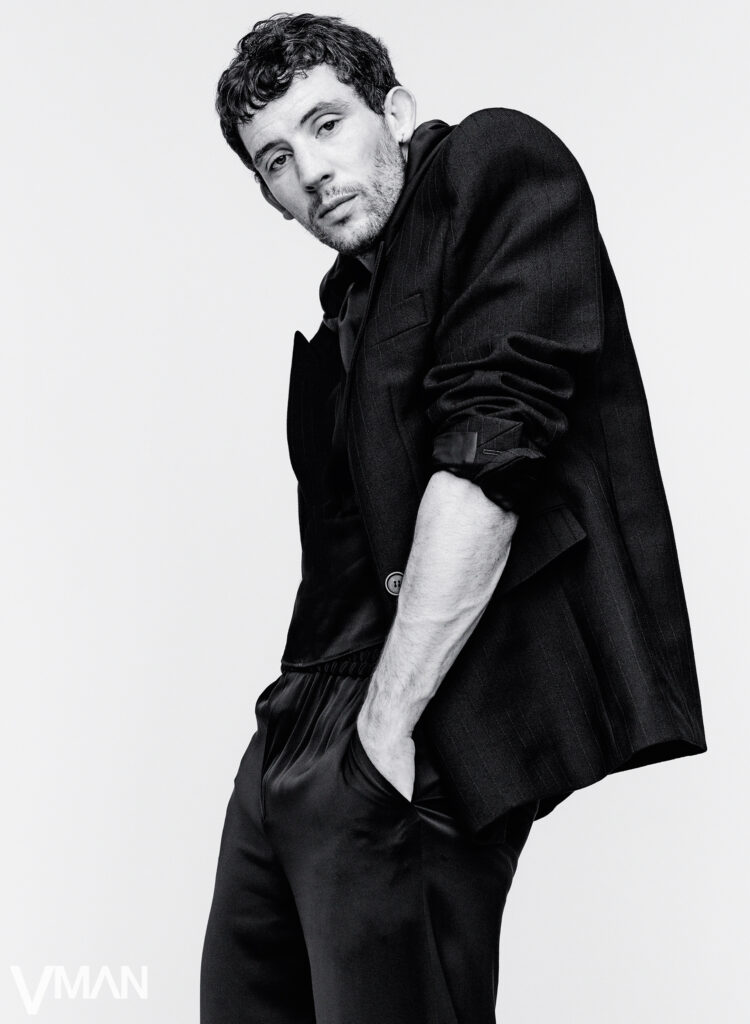
Z: How did you find Patrick? How did you let him into your spirit?
JO: Well, there was the tennis side of it, which all three of us had to go deep. I really enjoyed watching the players and the temperaments of those players. For me, the big one was [Nick]Kyrgios, who has this kind of fiery temper. Literally, his mood can change on a dime. So watching him was really helpful to me.
Z: Definitely. And you found an accent, physicality, and look—which we all know took a minute [laughs].
JO: I remember those days when the three of us were training together every day. You know this, Z—so I’m telling everyone else who wasn’t there—Mike Faist is an absolute machine. He absolutely loves the gym.
Z: There’s him, and then there’s us [laughs].
JO: Yeah, we were like, “Sure, this is fine, but also not that fine.” The big thing about the physicality stuff is—and I give credit to Luca on this—but it doesn’t matter who you are or how little you may care about how you look if you’re in really good shape, it does affect your confidence. I’m so glad we did all that training, and we got to spend time together.
Z: Yeah, it was our summer camp.
JO: It was a proper summer camp.
Z: It really was, we had P.E. in the morning, then lunch, and then actor’s camp to talk about that script.
Z: Is it easy to watch yourself, or is it hard?
JO: It is hard. I think with this one, it was a little easier because I was incredibly proud of getting to work with you guys and Luca. And I knew Luca wasn’t going to make us look bad. He’s got such sensitivity about how everyone looks, so that was less of a concern for me. But yes, I generally don’t enjoy watching myself.
When I watched a preview of it, I took my best friend who I’ve grown up with –
Z: What was their reaction?
JO: Oh, it was wild. He’s like the most critical person in the world, but he was like, “Josh, this movie is incredible.” And I promise you, he never says this stuff – he’ll be the first one to say, “I hate this movie. You’re terrible in this film.”
Z: You have to have those friends.
JO: You have to have those friends. But he is so hyped about the film. And I definitely felt this at the time, but it’s one of a few movies I could watch again and again and again.
Actually, there was one night when we had dinner with Amy and Luca – we were all together in Boston and we were talking about our favorite movies. It was quite early on, and I remember being like, “Oh my god, they’re about to come to me.” I’ve got to think of something artistic to impress Luca and then something fun that doesn’t make me seem like a snob. And then I remember it coming around to me, and I said Accattone, which is a brilliant but niche Italian movie. And Luca looked really impressed, and I thought, “Well done, Josh.” And, of course, my favorite film is Superbad, which ticked a massive box for Amy. And Luca loves Superbad – everyone loves Superbad.
Then afterwards, they asked me why I liked Superbad, and I think one of the things about a film like Superbad is that I could just watch it over and over again. And I’m not saying that Challengers is like Superbad in any way, but I think Challengers has the potential. This is what my friend was articulating. It can be one of those films that you can just keep watching because it’s such a thrill. It’s like a drug. The excitement just drives you right through to the film, and it doesn’t feel long. You don’t labor through it. So for me, that’s our biggest achievement – the fact that someone would want to go back and watch it again. That’s a really great compliment, I think.
Z: Yeah, I’ve just enjoyed the conversations after the fact – Team Tash, Team Art, Team Pat. Who’s the bad guy? Who’s the good guy? And it changes every time.
You can come back and see people from a different perspective, which I think is the point of what we do, you know? Hopefully, it makes people human. They’re messy, and they make bad decisions (or complicated decisions), and I think it’s our job to let people see different versions of themselves or people that they love in that way.
JO: And that’s the thing. How many times have we all said, “Oh, they behaved badly in that situation.” And then a few years down the line been like, “Actually, I didn’t behave perfectly in that situation. I could have dealt with that better.” This is kind of the journey we all went on in this movie. At different moments you think you’re in the right and they’re in the wrong, and then that should completely turn itself on its head. I think we’re all guilty of that, and I think people will really see that in the movie, which is great. That’s what our goal is.
Z: I mean, humanity at the end of the day.
JO: Exactly, humanity.
Z: Love each other and don’t manipulate your friends or your spouses. I often call this movie “Codependency: The Movie.”
JO: I love that as a tag. I can already see that making its way around.
Z: Yeah, I love seeing peoples’ take on the characters when they’ve only seen the trailer. It’s like, just wait – you have no idea.
JO: Just wait – you’re going to be really surprised.
My dad, who was an English teacher, used to always talk about Shakespeare. And the thing he’d tell me about Shakespeare’s villains is that they don’t think of themselves as villains. That message has always stuck with me, but particularly as I took on the role of Patrick in Challengers.
Z: Yeah, they have to believe in their purpose and what they’re doing. So that brings me to your purpose. What does the future look like for Josh?
JO: As I said earlier, I’m still trying to figure it all out. And I quite enjoy not having a specific plan.
Z: I was going to say – you did our movie, and then you went and lived a nomadic, beautiful life.
JO: Yeah, I had the biggest contrast last year. I can’t remember if you saw the apartment I had in Boston—you must have because you came over to watch Ratatouille. But I had this insane apartment in the Four Seasons while we were filming, and then a month later, I was in my camper van on the side of a lake in the middle of Italy. I was using a canoe to get my shopping from the nearby village. The only way to get there was to row myself. So going forward, there’s no real plan.
I’m just figuring it out as I go along. I’m inspired by people like you, Luca, and all the great people I’ve got to work with. I’m just going to keep following their example and see what comes my way.
Z: And you’ve got your ceramics.
JO: It’s always like the funny thing. I feel like I can go off in my own head at times and be a little distant. But if anyone strikes up a conversation with me about ceramics, they’ll first be like, “Oh my god, Josh is lit up about something.” And then, like five minutes later, be like, “Shut up. Stop talking about this.” But I find that everyone has a thing that makes them tick [laughs]. There was a day when we were shooting and Beyonce’s new track was coming out – and I’m not saying that Beyonce is like your equivalent of my ceramics, but no one could talk to Z. Like we didn’t engage that entire day, you were just listening to that song every second.
Z: You know what it was? It was our last day in Boston. And I was like, “What are the odds?” She gave us a good song to give us our farewell.
JO: That is true. It was so good. You were loving it.
Z: I remember you telling me all the different names of famous ceramicists one day, and I thought it was really cool that you have something that grounds you outside of what we do.
JO: Ultimately, this is a job. And while I love what I do, I think there’s got to be something else. You have to keep these other things sacred. And you’ve got to hold on to them because they’re as important as anything else. In some ways, they do inform how you work. And as much as I love ceramics for the fact that they’re functional and they look pretty, I also love the process. I love the process of taking something from the ground, using your hands, and making something that lives forever. And I think that ties into acting — we use our imagination and the source material from great writing, and work with another human being to create something that hopefully lasts forever.
A note from the editors of VMAN: The interviews, photography, and video in this cover story predated the SAG-AFTRA strike.
This cover story appears in the pages of VMAN 51: now available for purchase!
Photography Nathaniel Goldberg
Fashion Gro Curtis
Creative Director / Editor-In-Chief Stephen Gan
Groomer Mary-Jane Gotidoc using Giorgio Armani Makeup & Skincare and Hair By Sam McKnight
Producer Michaël Lacomblez (Louis2)
Production manager Ambre Silvestre (Louis2)
Digital technician Sarah Reimann (Imagin Productions)
Photo assistants Aurélien Nobécourt, Sebastian Mccluskey
Stylist assistant Jadzia Scott
Location Big Sky Studios
Discover More







